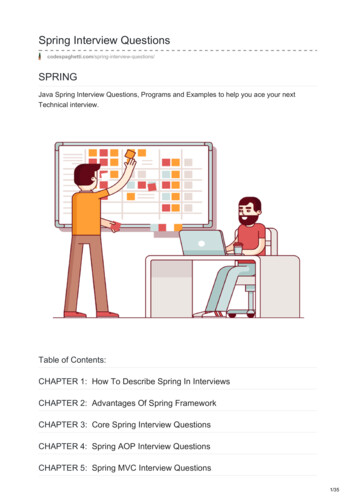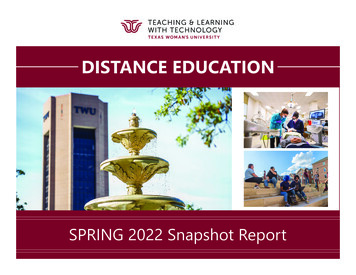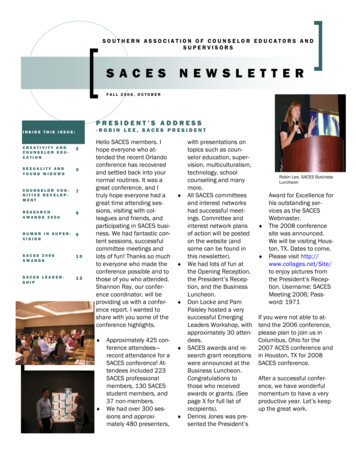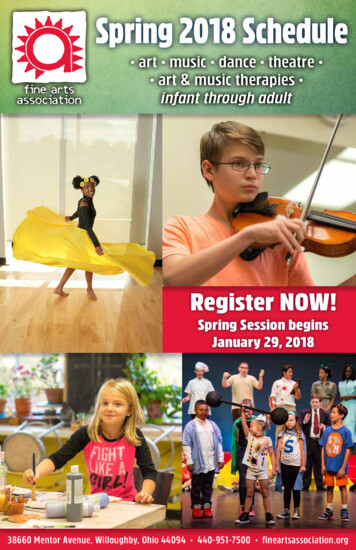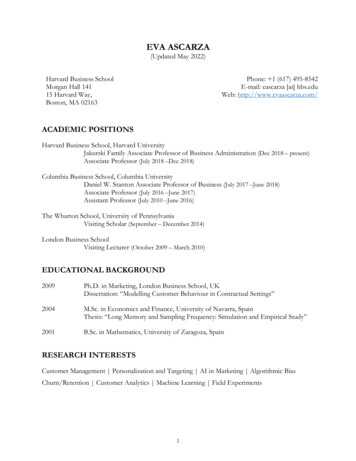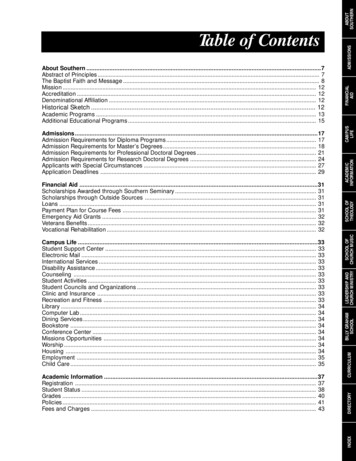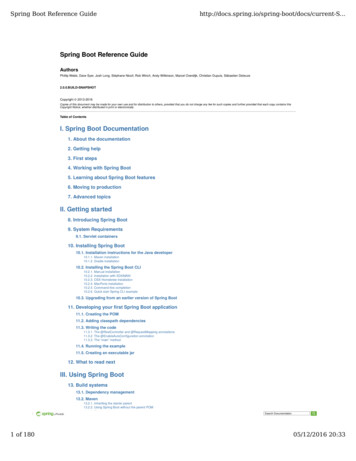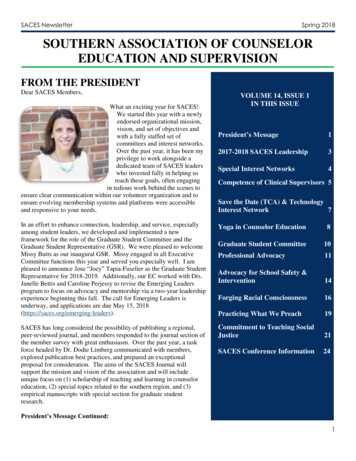
Transcription
SACES NewsletterSpring 2018SOUTHERN ASSOCIATION OF COUNSELOREDUCATION AND SUPERVISIONFROM THE PRESIDENTDear SACES Members,What an exciting year for SACES!We started this year with a newlyendorsed organizational mission,vision, and set of objectives andwith a fully staffed set ofcommittees and interest networks.Over the past year, it has been myprivilege to work alongside adedicated team of SACES leaderswho invested fully in helping usreach these goals, often engagingin tedious work behind the scenes toensure clear communication within our volunteer organization and toensure evolving membership systems and platforms were accessibleand responsive to your needs.VOLUME 14, ISSUE 1IN THIS ISSUEPresident’s Message12017-2018 SACES Leadership3Special Interest Networks4Competence of Clinical Supervisors 5Save the Date (TCA) & TechnologyInterest Network7In an effort to enhance connection, leadership, and service, especiallyamong student leaders, we developed and implemented a newframework for the role of the Graduate Student Committee and theGraduate Student Representative (GSR). We were pleased to welcomeMissy Butts as our inaugural GSR. Missy engaged in all ExecutiveCommittee functions this year and served you especially well. I ampleased to announce Jose “Joey” Tapia-Fuselier as the Graduate StudentRepresentative for 2018-2019. Additionally, our EC worked with Drs.Janelle Bettis and Caroline Perjessy to revise the Emerging Leadersprogram to focus on advocacy and mentorship via a two-year leadershipexperience beginning this fall. The call for Emerging Leaders isunderway, and applications are due May 15, 2018(https://saces.org/emerging-leaders).Yoga in Counselor Education8Graduate Student Committee10Professional Advocacy11Advocacy for School Safety &Intervention14Forging Racial Consciousness16Practicing What We Preach19SACES has long considered the possibility of publishing a regional,peer-reviewed journal, and members responded to the journal section ofthe member survey with great enthusiasm. Over the past year, a taskforce headed by Dr. Dodie Limberg communicated with members,explored publication best practices, and prepared an exceptionalproposal for consideration. The aims of the SACES Journal willsupport the mission and vision of the association and will includeunique focus on (1) scholarship of teaching and learning in counseloreducation, (2) special topics related to the southern region, and (3)empirical manuscripts with special section for graduate studentresearch.Commitment to Teaching SocialJustice21SACES Conference Information24President’s Message Continued:1
SACES NewsletterSpring 2018Review of Editor applications will begin May 14, 2018; we expect to open a call for editorial board members over thesummer and be ready to launch a call for manuscripts during our conference in October.Finally, your leadership team is fully engaged in conference planning in anticipation of our time together in Myrtle BeachOctober 11-13, 2018. Dr. Natoya Haskins (President-Elect) has built a strong board of leaders who are planning theconference including Dr. Kent Butler and Latrina Raddler who are serving alongside her as conference co-coordinators.Dr. Cheryl Wolf has donated countless hours to helping build out the new conference proposal, registration, andcontinuing education system. Dr. Elizabeth Villares has been patient and meticulous as we navigated proposals andselected over 550 sessions to be offered during the 2018 conference. Conference registration will open May 15, 2018.(https://saces.org/conference).I am honored to have served you in this role, and I look forward to many more years of working together in SACES.Casey Barrio MintonSACES President, 2017-2018GETINVOLVEDWITHSACES!Applications for SACES 2018-2020 Emerging Leaders are due5/15. See saces.org/Emerging-Leaders for more information.Applications for SACES Inaugural Journal editor are due5/14. See saces.org for more information.2
SACES NewsletterSpring 20182017 – 2018 SACES LEADERSHIPPast-PresidentEXECUTIVE COUNCILMelanie IarussiNova Southeastern UniversityPresidentCasey Barrio MintonUniversity of TennesseePresident-ElectNatoya HaskinsWilliam & MarySecretaryRabeena AlliLoyola University MarylandTreasurerCheryl WolfWestern Kentucky UniversityGraduate Student Rep.Missy ButtsThe University of North Carolina at CharlotteCOMMITTEE CHAIRSAwardsPeggy CeballosUniversity of North TexasLacey RicksUniversity of West GeorgiaBudget & FinanceCheryl WolfWestern Kentucky UniversityBylaws & ResolutionsMelanie IarussiNova Southeastern UniversityConferenceNatoya HaskinsWilliam & MaryGraduate StudentMissy ButtsThe University of North Carolina at CharlotteJanelle BettisArgosy University, Northern VirginiaPanagiotis MarkopoulosUniversity of New OrleansErin Abigail MardenTexas Tech UniversityChristopher BelserUniversity of Central FloridaChristine EbrahimLoyola University New OrleansMelanie IarussiNova Southeastern UniversityResearch & Practice Grants Melanie IarussiNova Southeastern UniversityNewsletter Co-EditorsBrandee ApplingAuburn UniversityAndrea Kirk-JenkinsWestern Kentucky UniversityWebmasterCheryl WolfWestern Kentucky UniversityWebinarsSPECIAL COMMITTEESSusan FosterThe Chicago School of Professional PsychologyJournal ExplorationDodie LimbergSocial MediaMembershipNominations & ElectionsUniversity of South Carolina3
SACES NewsletterSpring 2018SPECIAL INTEREST NETWORKSClinical Mental Health CounselingTony MichaelTennessee Tech UniversityCollege Counseling & Student AffairsElizabeth Likis-WerleEast Tennessee State UniversityDistance/Online Counselor EducationAndrew BurckMarshall UniversityEthics & Professional DevelopmentNathaniel BrownUniversity of GeorgiaInternational CounselingWendy GreenidgeLamar UniversityAmanuel AsfawAustin Peay State UniversityDilani PereraUniversity of Houston - Clear LakeMichael JonesMessiah CollegeClare MerlinThe UNC at CharlotteChristy LandUniversity of West GeorgiaService LearningLacey RicksUniversity of West GeorgiaSocial Justice and Human RightsCandice Norris-BrownIndiana Wesleyan UniversitySupervisionSeth HaydenWake Forest UniversityRaul MachucaBarry UniversityTechnologyPanagiotis MarkopouloUniversity of New OrleansWomen'sCaroline PerjessyArgosy University - TampaNoelle St. Germain-SehrArgosy University - DallasMulticultural CounselingSchool Counseling4
SACES NewsletterSpring 2018How Does the Counseling Profession Ensure Competence ofClinical Supervisors in Terms of Knowledge and Skills?By Dr. Andrea Barbian-Shimberg, LPC, NCC & Dr. Sara Bender, LMHC, NCC, DCC, ACSProfessional counseling serves as an avenue to offersupport, counsel, and clinical insight to individualsin need. The profession’s demands for clinicaleducation and training serve to set professionalcounseling apart from other forms of laycounseling. Standardized requirements for clinicaleducation, training, certification, and licensure serveas gatekeeping methods, which help to ensure thatindividuals are qualified and competent to practicein the field. Setting standards and establishingremediation processes for instances in whichcompetencies are not met, not only safeguards thecounseling profession as a whole, but, moreimportantly, protects the clients served.Within the counseling profession, clinicalsupervision is a source of gatekeeping, whether it beduring the practicum and internship portions ofcounselor education or post-graduation duringprovisional licensure. Often, master’s levelcounselors function in supervisory roles during theircareers. Unfortunately, to date, there is a lack ofstandardized clinical education and trainingrequirements for clinical supervisors. On the statelevel, just as some states’ guidelines are morestringent than others regarding licensurerequirements, states also vary in their qualificationsfor clinical supervisors (Nate & Haddock,2014). On the national level, the NBCC offers anational certification similar to that of the NCC, theApproved Clinical Supervisor (ACS); however, it isan optional certification for clinical supervisors.Furthermore, a lack of standardized education andtraining for supervisors may be problematic for thecounseling profession in that it presents a situationwhere there seems to be minimal gatekeeping forthe gatekeepers themselves.Dr. Andrea BarbianShimbergDr. Sara BenderLMHC, NCC, DCC, ACSLPC, NCCRecent and past literature pertaining to master’slevel counselor education and training fails toexamine both self-efficacy and pedagogy specific tosupervision knowledge and skills. In 2017, a pilotstudy was performed by Barbian-Shimberg,specifically focused on counseling professionals’self-efficacy in regard to their perceived knowledgeand ability to perform supervisory tasks. The pilotstudy included 30 recent or anticipated graduatesfrom CACREP accredited master’s level counselingprograms between December 2016 and December2017. Participants were asked to use theCompetencies of Supervision Scale (CSS) byBorders (2015) to self-report their perceivedknowledge of and ability to perform supervisoryskills.While results of the pilot study indicated that alarger scale study, currently in process, is feasibleand needed, preliminary trends can beseen. Preliminary results suggested that bothexpected and recent graduates ranked themselveshigher on the CSS than anticipated. Further researchwith larger sample sizes is needed to determine ifthat trend is significant and can be applied to thegeneral population of master’s level counseling5
SACES NewsletterSpring 2018supervisors. The self-efficacy of master’s levelcounselors related to supervision knowledge andskills is important, as this information will assist infuture development of counselor educationprograms.training of both counselors and supervisors, in acontinued effort to set professional counseling apartfrom other forms of lay counseling.Further investigation will assist in determining thespecific needs of standardized education, training,and licensure requirements. Additionally,assessment of supervision pedagogy is needed toensure consistency and competency in counseloreducation. Given that supervision is one of theprimary forms of gatekeeping in the counselingprofession, it is important that as professionalcounselor educators and supervisors, we advocatefor not only our students, but our profession as awhole. It is important that the profession continueto promote high demands for clinical education andBarbian-Shimberg, A. (2017). Self-efficacy ofmaster’s level counselors in regards tosupervision knowledge and skills.(Doctoral Dissertation).Borders, L. (2015). Competencies of SupervisionScale {Document}. Retrieved from: L.Borders, personal communication, January26, 2017.Nate, R. & Haddock, L. (2014). An exploration ofcounselor supervisor requirementsacross the United States. Vistas Online, 31,1-14.References6
SACES NewsletterSpring 2018Save the Date!Save the date for the Tennessee Counseling Association’s 2018 TCA Conference, November 8-12, 2018, in Nashville,TN. The conference theme is “Many Voices, One Profession”.Pre-conference sessions will occur on Thursday (11/8), with a welcoming reception Thursday evening. The conferenceeducational sessions will run on Friday (11/9) through and Monday (11/12) from 8 am to 5pm. The conference hotel is theMarriott Nashville Airport, located at 600 Marriott Drive, Nashville, TN, 37214.SACES Technology Interest NetworkThe SACES Technology Interest Network mission is to educate and provide valuable technology relatedinformation and resources that counselor educators, mental health practitioners, and counselors-in-training canutilize in academia and mental health, by strengthening counselors’ technology awareness. In addition, itprovides an engaging learning/social environment forum that members are encouraged to utilize and interactwith other members as it relates to technology topics that are being posted on a weekly basis on the SACESwebsite. For more information, visit and subscribe to the Technology in Counseling forum.Don’t forget to stay connected with SACES, by joining the following social media groups:SACES Facebook (for professionals)SACES Facebook for graduate studentsSACES TwitterSACES YouTubeIf you have any questions, do not hesitate to contact our committee members, Maria Haiyasoso, Erin Marden, orPanagiotis Markopoulos (network chair), at sacessocialmedia@gmail.com7
SACES NewsletterSpring 2018Implications for Yoga and Counselor Education andSupervisionBy PaQuita R. PullenMental health clinicians have increasingly embraced theutilization of yoga as a complimentary intervention topsychotherapy (Burnett-Ziegler, Schuette, Victorson, &Wisner, 2016; Jindani & Khalsa, 2015, Lin, Huang, Shiu& Yeh, 2015; Novotney, 2009). Yoga is a mind-bodyapproach that has been supported by research studies ashaving many positive effects on symptoms associatedwith anxiety, depression, work related stress, and posttraumatic stress disorder (Burnett-Ziegler, Schuette,Victorson, & Wisner, 2016; Jindani & Khalsa, 2015,Lin, Huang, Shiu & Yeh, 2015). This is beneficial tocounselors and clients as research supports yoga as acost-effective, adjunct, and in some cases an alternativeto conventional mental health services (Shulz-Heik etal., 2017). The purpose of this article is to discuss howthe contemplative practice of yoga can contribute tocounselor education by examining a recent study onyoga and counseling education, providing implicationsfor counselor educator and supervision programs, andtips for incorporating yoga into the graduate levelcounseling curriculum.Exploring the Contributions of a Yoga Practice toCounselor EducationPittoello (2016) conducted a qualitative study exploringthe experience of master level counselors whoparticipated in an ashtanga yoga class. Participants in thestudy engaged in a yoga class three times a week foreight weeks. Three major themes emerged from thestudy as benefits to the participation in the yoga classes.These themes included support and structure of the yogacourse, present-centered experience, and personal andprofessional benefits. The scheduled time of the courseand support of the teacher and group characterizedsupport and structure. The present-centered experiencewas defined as a culmination of embracing acceptance,awareness, and self-knowledge. On a personal level, theparticipants found that they were more aware of theirbodies, emotions, and thoughts, which assisted them inaddressing patterns of anxiety and stress responses.Professionally, participants reported an improvement ofcounseling presence, process, and techniques. Thefindings of this and increase self-PaQuita R. Pullen, M.A., NCCArgosy University-Nashvillestudy were consistent with previous research about thebenefits of yoga to reduce stress and increase selfawareness and attentiveness ((Burnett-Ziegler, Schuette,Victorson, & Wisner, 2016; Jindani & Khalsa, 2015)Implications for Counselor Educator andSupervision ProgramsResearch supports that educators and supervisors maybenefit by adding yoga to the curriculum as a tool for thefacilitation of personal and professional growth instudents and supervisees. Teachers and supervisors oftenencourage the utilization of self-care but have limitedtime to actually teach self-care (Pittoello, 2016). Addingyoga as a part of the graduate counseling programprovides students and supervisees with the opportunityof self-discovery, self-sufficiency, and self-care (whichare vital components to the counseling profession).Furthermore, incorporating yoga into the curriculummay also assist counseling students with being presentand more effective with clients (Pittoello, 2016).Considering the aforementioned findings, implementingyoga into graduate counseling programs can demonstratecounselor educators’ ethical responsibility andcommitment to client and student welfare, utilization ofself-growth experiences, and promotion of techniquesthat possess an empirical or scientific foundation(American Counseling Association, 2014).8
SACES NewsletterTips for Incorporating Yoga into the CurriculumYoga consists of specific postures that exercise the body,breath control and meditation (Keosaian, 2016; Lin,Huang, Shiu & Yeh, 2015). Therefore, counseloreducators have many opportunities to incorporate yogainto their curriculum. A list of examples include:beginning each class with time for meditation or aguided meditation, encouraging students in a groupcounseling and work course to participate in a yoga classduring the academic term as a self-care strategyappropriate to the counselor role, requiring students in amulticultural course to complete an assignment about theimpact of heritage, attitudes, beliefs, and understandingof yoga with minority populations, designing studyproposals on the topic of yoga in research courses,discussing how mind-body approaches such asyoga serve as an adjunct technique or intervention tomajor counseling theories, and studying the impact ofyoga on specific disorders in a diagnosis and treatmentcourse. This list is not exhaustive; therefore, counseloreducators are encouraged to think of other ways toincorporate yoga into their specific courses.ConclusionIn summary, the utilization of yoga for the treatment of avariety of mental health conditions has gained popularityin the counseling profession. The benefits of yogaextend beyond aiding clients who struggle withconditions such as anxiety, depression and other chronichealth conditions to also aiding graduate levelcounseling students who are learning how to best serveand treat clients with these conditions. As more attentionand research shifts towards the use of yoga with clients,counseling students, and overall treatment of mentalhealth, counselor educators can advance in support ofthis trend by discovering ways to incorporate yoga intoexisting graduate level counseling curriculum.Spring 2018ReferencesAmerican Counseling Association. (2014). ACA Code ofethics. Alexandria, VA: Author.Retrieved f-ethics.pdf.Burnett-Ziegler, I., Schuette, S., Victorson, D., &Wisner, K. L. (2016). Mind-body approachesto treating mental health symptoms amongdisadvantaged populations: A comprehensivereview. The Journal of Alternative andComplementary Medicine, 22(2), 115-124.doi: 10.1089/acm.2015.0038Jindani, F. A & Khalsa, G. F. S. (2015). A yogaintervention program for patients suffering fromsymptoms of posttraumatic stress disorder: Aqualitative descriptive study. The Journalof Alternative and Complementary Medicine,21(7), 401-408. doi: 10.1089/acm/2014.0262Keosaian, J. E., Lemaster, C. M., Dresner, D., Godersky,M. E., Paris, R Saper, R. B. (2016).We’re all in this together: A qualitative study ofpredominantly low-income minorityparticipants in a yoga trial for chronic low backpain. Complementary Therapies inMedicine, 24, 34-39. doi:10.1016/j.ctim.2015.11.007Lin, S., Huang, C., Shiu, S., & Yeh, S. (2015). Effects ofyoga on stress, stress adaption, andheart rate variability among mental healthprofessionals-A randomized controlled trial.Worldviews on Evidenced- Based Nursing,12(4), 236-245.Novotney, A. (2009). Yoga as a practice tool. Retrievedfrom apa.orgPittoello, S. R. (2016). Exploring the contribution of ayoga practice to counselor education.Canadian Journal of Counseling andPsychotherapy, 50 (2), 91-107.Shulz-Heik, J. R., Meyer, H., Mahoney, L., Stanton,M.V., Cho, R. H Bayley, P. J. (2017).Results from a clinical yoga via telehealthprovides comparable satisfaction and healthimprovements to in-person yoga. BMCComplementary and Alternative Medicine, 17, 19. doi: 10.1186/s12906-017-1705-4.9
SACES NewsletterSpring 2018Graduate Student CommitteeHello All!The 2017-2018 SACES Graduate Student Committee iscontinuously working to meet the needs of studentmembers of SACES. In November, we sent out thegraduate student survey to provide graduate studentswith the opportunity to voice their needs and concerns asstudent members of the organization. The surveyaddressed expectations and topics of interest for the2018 SACES Conference in Myrtle Beach, SouthCarolina. The survey also asked graduate students aboutwhat they hoped to gain from their SACES Membership.Some common themes from the survey regardingexpectations for the conference and membershipincluded: mentorship, professional development,involvement in leadership, networking with otherstudents and counselor educators, and engagement in theprofession. Students also indicated that they hoped to seeconference programs related to the dissertation process,multicultural issues, legal and ethical issues in counseloreducation, wellness, school counselor education, andresearch efficacy and development. The SACESGraduate Student Members Survey is still open; pleaseconsider participating using this link:http://www.saces.org/grad student survey. The resultswill be used to plan and develop conference programsand events for graduate students.In addition, we are in the process of buildinga database of resources to help students begin tonavigate the world of counselor education. The resultsfrom the graduate student survey indicated that studentsare in need of information on a variety of topics thatwould support their research, teaching, supervision, anddevelopment as future counselors and counseloreducators. Our goal is to use this information to create acentral location of resources where students can seekanswers to questions on a variety of topics. Please emailJanellebettis@gmail.com or cbutts4@uncc.edu with anycontent that might be useful for our graduate students.Keep an eye out for these resources on the SACESwebsite in the coming weeks!Missy and Janelle10
SACES NewsletterSpring 2018Professional Advocacy: The What, Why, and How?By John J.S. HarrichandAssessing the current political climate in the UnitedStates, one comes to the realization that Americansare in a state of stress and anxiety (Myers, 2017)especially in relation to the Republican Party’s planto repeal and replace the Affordable Care Act. Forcounselors and educators, this reality takes ongreater significance when viewed in relation to ourrole as advocates. It appears that many of ourcounseling peers question if professional advocacymatters. As a profession in general, and counseloreducators specifically, counselors must beknowledgeable of and actively involved inmodeling professional advocacy thereby ensuringthat clients are adequately cared for and theprofession’s voice continues to be heard. Thepurpose of this article is to provide an overview ofprofessional advocacy in an effort to help students,counselors, and counselor educators understand thisfundamental component of our professionalidentity.The American Counseling Association’s Code ofEthics (ACA, 2014) and the 2016 Council forAccreditation of Counseling & Related EducationalPrograms (CACREP) Standards (2015) specifycriteria mandating counselors to engage in advocacyfor clients and the counseling profession. Althoughliterature exists regarding advocacy, counselorscontinue to fall short in engaging and/or meetingthese standards. In addition, counselors lack anunderstanding of the ways in which political andsocioeconomic forces cause problems for our clients(Roysircar, 2009; West-Olatunji, 2010).The What?The profession of counseling engages in trainingcompetent counselors to provide support andempowerment to individuals, minority groups, andcommunities experiencing alienation,discrimination, and marginalization; learnedhelplessness; and internalized hatred (Roysircar,2009). Sweeney (2012) defines professionaladvocacy as “knowledge, skills, and competenciesthat advance the professionthrough deliberate,thoughtful actions thatinform and influenceothersto support professionalcounselors because of thebenefits their servicesbring to individuals,groups, and institutions”(pp. 81-82).John J. S. Harrichand, M.A., CSACDoctoral CandidateLiberty UniversityThe Why?Professionaladvocacy by the ACA, American Mental HealthCounselors Association (AMHCA), and theNational Board of Certified Counselors (NBCC),has resulted in a number of changes in favor ofprofessional counselors and the clients we serve,including but not limited to: Counselors being included in thePublic Health Services Act achievingcore provider status.The Fair Access Coalition on Testing(FACT) to allow counselors toadminister and interpret assessments(Myers, Sweeney, & White, 2002).Licensed Professional Mental HealthCounselor positions within the U.S.Department of Veterans Affairs(Sweeney, 2012).In the absence of advocating for the counselingprofession, however, limitations by regulations andother professionals restrict the rights of theprofessional counselor from engaging in service toany particular group in need of mental healthassistance (Sweeney, 2012). Clients in need ofcounseling services are less likely to receive them ifcounselors cannot find employment and/or areunable to work as counselors. Therefore,“advocating for ourselves is also advocating for our11
SACES Newsletterclients” (Remley, 2015, p. 10). Currently, threemajor areas where counselors need to advocate forthe profession include job classification in theworkplace, state licensure board laws andregulations, i.e., licensure portability, and theexpansion of Medicaid to include professionalcounselors.The How?Eriksen (1997; 1999) and Milsom (2009) providethe following six (6) strategies for advocacy: 1)Identify the problem; 2) Assess available resources;3) Engage in strategic planning; 4) Train others tobe advocates; 5) Implement the action plan; and 6)Celebrate accomplishments. In addition, theprofessional counseling honor society, Chi SigmaIota (CSI) outlines six (6) advocacy themes: 1)Counselor education; 2) Intrapersonal relations; 3)Marketplace recognition; 4) Interprofessionalissues; 5) Research; and 6) Prevention/wellness(Chang, 2012), that all counselors and counselorsin-training can incorporate within their professionalidentity.Addressing the topic of professional identity, Dr.Doyle (2016), in his article for Counseling Today,provides concrete tips for counselor advocacy byencouraging counselors to:1. Use the words counselor/counseling2. Refer to other counselors (inpractice)3. Create a webpage to solidifypresence4. Engage the media5. Get to know state and locallegislators6. Become actively involved in statelicensure boardsThe bottom line is that every professional counselorand counselor-in-training can and should be anadvocate for the counseling profession. By creatinga stronger and unified professional identity,counselors are better positioned to be advocates forthe profession and clients. Counselors-in-training,counselors, supervisors, and educators canparticipate in advocacy initiatives through ChiSpring 2018Sigma Iota chapters, mentorship,legislative/advocacy day and service opportunitiesat the local, state, regional, and national levels. Inclosing, “true change occurs when counselorsindividually take responsibility for the professionand take action in their work places, in agencies,and within licensure boards” (Remley, 2015, p. 11).ReferencesAmerican Counseling Association. (2014). ACA code ofethics. Alexandria, VA: Author.Council for Accreditation of Counseling and RelatedEducational Programs (CACREP). (2015). 2016CACREP standards. Retrieved 0/2016-CACREP-Standards.pdfChang, C. Y. (2012). Professional advocacy: Aprofessional responsibility. In C. Y. Chang, C. A.Barrio Minton, A. L. Dixon, J. E. Myers, & T. J.Sweeney (Eds.), Professional counseling excellencethrough leadership and advocacy (pp. 95-107). NewYork, NY: Routledge.Doyle, K. (2016). Don’t use the ‘t’ word and five othertips for counselor advocacy. Counseling Today,58(9). Retrieved riksen, K. (1997). Making an impact: A handbook oncounselor advocacy. Washington, DC: AcceleratedDevelopment.Eriksen, K. (1999). Counselor advocacy: A qualitativeanalysis of leaders’ perceptions, organizationalactivities, and advocacy documents. Journal ofMental Health Counseling, 21(1), 33-49.Milson, A. (2009). Advocacy for the counselingprofession. In B. T. Erford (Ed.), Orientation to thecounseling profession (pp. 321-338). Boston, MA:Pearson Education.Myers, J. W., Sweeney, T. J., & White, V. E. (2002).Advocacy for counseling and counselors: Aprofessional imperative. Journal of Counseling andDevelopment: JCD, 80(4), s, L. (2017). High anxiety. Counseling Today.Retrieved /Remley, T. (2015). Protecting counseling professionalidentity through advocacy for the profession. CSIExemplar Special Edition, 30(2), 10-12.12
SACES NewsletterRoysircar, G. (2009). The big picture of advocacy:Counselor, heal society and thyself. Journal ofCounseling and Development: JCD, 87(3), y, T. J. (2012). Professional advocacy: Beingallowed to do good. In C. Y. Chang, C. A. BarrioMinton, A. L. Dixon, J. E. Myers, & T. J. Sweeney(Eds.), Professional counseling excellence throughleadership and advocacy (pp. 81-93). New York,NY: Routledge.Spring 2018West-Olatunji, C. (2010). If not now, when? Advocacy,social justice, and counselor education. Counselingand Human Development, 42(8), 1-12.13
SACES NewsletterSpring 2018Advocacy for School Safety and Mental Health InterventionBy Kristopher Garza, Ph.D., LPC-S, NCC; Karen Ferguson, Ph.D., LPC-S, & Ya-Wen Liang,Ph.D., NCCIn light of the recent catastrophic school shootings,America is at a standstill on how to find a solutionto this ongoing crisis. According to EducationWeek, there were 10 school shootings betweenJanuary 1st and April 20th, 2018 where gunfirewas reported on a K-12 campus during schoolhours or extracurricular activities. Those incidentsresulted in 22 deaths and 50 i
careers. Unfortunately, to date, there is a lack of standardized clinical education and training requirements for clinical supervisors. On the state level, just as some states' guidelines are more stringent than others regarding licensure requirements, states also vary in their qualifications for clinical supervisors (Nate & Haddock, 2014).
